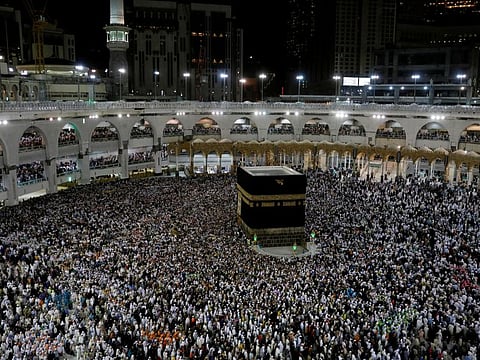COVID-19: Saudi Arabia urges Muslims to hold off on Haj plans
Don’t sign any agreements until we have clear vision, says minister

Riyadh: Saudi Haj and Umrah Minister Mohammed Saleh Bin Taher Banten has requested Muslims around the world to wait till a clearer picture emerges before making Haj plans, given the coronavirus pandemic that is ravaging the globe right now. “The kingdom of Saudi Arabia is prepared to secure the safety of all Muslims and nationals,” Banten told state television. “That’s why we have requested from all Muslims around the world to hold onto signing any agreements until we have a clear vision.”
Banten’s statement constitutes the first official comment from the kingdom on the Haj so far.
Banten’s comments at a time when the kingdom has reported 10 deaths an almost 1,600 cases of COVID-19 infections. Saudi Arabia has barred people from entering or exiting three major cities, including Mecca and Medina, and imposed a nighttime curfew across the country.
Journey of a lifetime
Each year, up to 2 million Muslims perform the Haj, which all able-bodied Muslims with the means are required to perform once in their lifetime. For many, the Haj takes years of planning and savings, and among the faithful, it is seen as a journey of faith, a journey of a lifetime.
Standing in Mecca in front of the Kaaba that Muslims pray towards five times daily, Banten also said the kingdom was already providing care for 1,200 pilgrims stuck in the holy city due to global travel restrictions. A number of them are being quarantined in hotels in Mecca, he said.
The state-run Saudi Press Agency cited Banten’s remarks in stories early Wednesday, saying that Muslims should “be patient” in making their plans for the Haj. The pilgrimage was expected to begin in late July this year.
71,000 cases in Middle East
Like other countries around the world and in the Middle East, Saudi Arabia has suspended all inbound and outbound commercial flights. The Middle East has more than 71,000 confirmed cases of the virus, most of those in Iran, and over 3,300 deaths. More than 851,000 people have been infected by the novel coronavirus across the world and 42,053 have died
In February, the kingdom took the extraordinary decision to close off the holy cities of Mecca and Medina to foreigners over the virus, a step which wasn’t taken even during the 1918 flu epidemic that killed tens of millions worldwide. Cancelling the Haj would be unprecedented in modern times, but curbing attendance from high-risk areas has happened before, including in recent years during the Ebola outbreak.
-With inputs from agencies
Sign up for the Daily Briefing
Get the latest news and updates straight to your inbox







